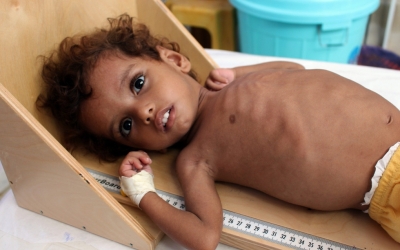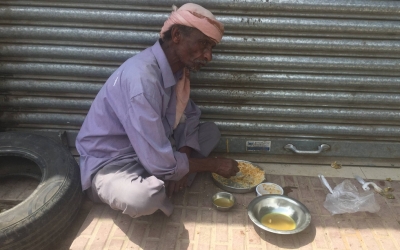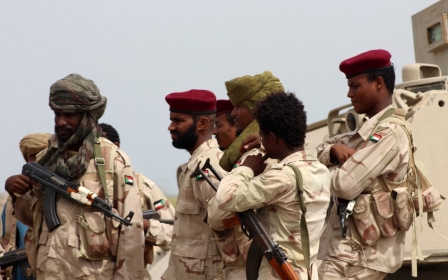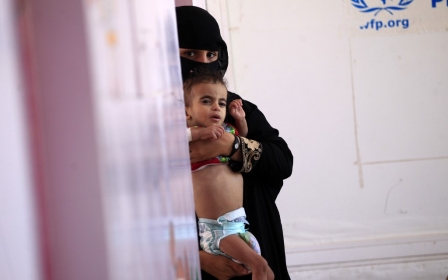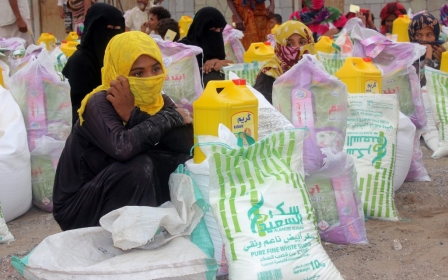First 'mercy flight' leaves Sanaa, but Yemeni patients worry it won't be enough
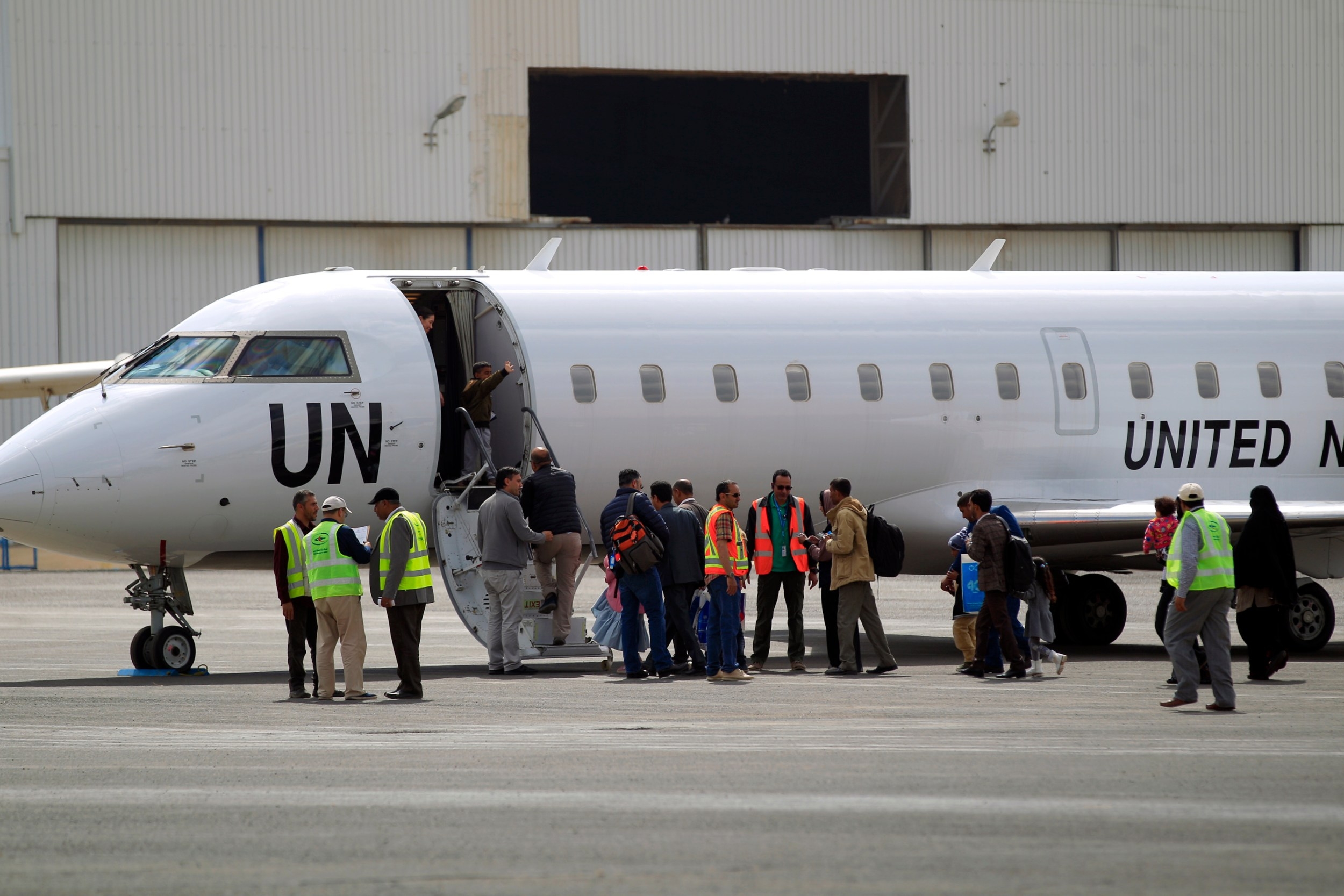
After more than three years of a Saudi-led blockade on Sanaa’s airport, a number of patients were set to fly out of the Yemeni capital on Monday on World Health Organisation (WHO) planes.
The news has been a glimmer of hope for Yemenis who desperately need access to specialised medical treatment abroad - but with an estimated 32,000 patients on a waiting list seeking to travel, such hope is slim.
According to WHO, the flights will offer a “lifeline” to a number of patients suffering from cancer, tumours or requiring organ transplants and reconstructive surgeries to survive - as both Egypt and Jordan announced they would host a number of Yemenis at medical centres.
Flights out of Sanaa have been blocked by the Saudi-led military coalition since August 2016. The Ministry of Health in Sanaa estimated that some 43,000 people have died since then awaiting specialised medical treatment only accessible abroad.
New MEE newsletter: Jerusalem Dispatch
Sign up to get the latest insights and analysis on Israel-Palestine, alongside Turkey Unpacked and other MEE newsletters
Speaking at a United Nations Security Council meeting in New York in mid-January, UN Special Envoy for Yemen Martin Griffiths said about 30 sick Yemenis were expected to leave the Yemeni capital - held by Houthi rebels since 2014 - for treatment abroad in coming weeks.
Confusion of numbers
There was confusion on Monday as a statement by the Norwegian Refugee Council (NRC) alleged that only seven patients would be able to board the first flight.
A statement by WHO stated that an unspecified “number of patients out of an initial group of 30 along with their respective travel companions” were on the first “mercy flight”.
“The remaining of the first group of 30 patients will travel in a second flight while more patients will follow on subsequent flights,” the statement read.
“I was happy to hear Martin Griffiths talking about reopening the Sanaa airport in February, but I was shocked to hear that only seven people can travel per week,” Wasim al-Ghail, a 39-year-old cancer patient, told Middle East Eye.
Ghail has tried to receive treatment in Sanaa, but could not access appropriate health care in the city. Doctors have advised him to travel abroad - but with Sanaa’s airport out of commission for commercial flights, the only way to do so would be to travel for hours on rough roads across the war-torn country to fly from airports in the faraway cities of Aden or Seiyun.
Ghail seemed pessimistic as doctors told him that he should travel abroad as soon as possible before cancer spreads to his liver.
“Most patients can’t wait for months and most of us may die in coming months,” he said. “I expect that the health ministry will face a problem to prioritise people each week.”
Mazen Ghanem, the manager of air transport in Sanaa, told Houthi-run Al-Masirah TV channel on Sunday night that there would be only four “mercy flights” per month - meaning only a few dozen patients can travel each month out of an estimated 32,000 awaiting treatment.
'Between 15 and 25 patients die every day as they can’t receive specialised medical treatment'
- Mazen Ghanem, manager of air transport in Sanaa
“Between 15 and 25 patients die every day as they can’t receive specialised medical treatment,” Ghanem said - highlighting that many patients could die before having a chance to leave the country.
The United Nation Humanitarian Air Service (UNHAS) has been transporting international non-government organisations (INGO) staff in and out of Sanaa, but patients are not allowed to use the same flights.
A source in the health ministry in Sanaa told MEE earlier on Monday that seven patients were leaving the airport with their companions inside a small WHO plane, stating that there wasn’t space to seat 30 patients with their companions.
“The whole capacity of the plane is less than forty passengers and some patients need to lie down, so the plane can’t take thirty as Griffiths said,” the source told MEE, on condition of anonymity because he was not authorised to speak to media.
“I hope that the UN mediates to reopen the Sanaa airport for commercial flights,” the source added.
A death sentence
For Ghail, it was incomprehensible that so few sick people could fly out.
“I hope that the UN can dedicate a plane to transport patients. Every day there are flights coming to and leaving from Sanaa and only employees of INGOs can get abroad,” Ghail added. “So we hope to get a plane.”
NRC expressed regret that the mercy flights provide little support as the war in Yemen has killed more than 100,000 people since 2015 in fighting alone, plus thousands more who have died from hunger and disease.
“Today's move comes too late for thousands of Yemenis who died waiting to leave the country for urgent life-saving care,” NRC said in a statement. “They were handed a death sentence when the Saudi-led coalition blockaded northern Yemen by closing down the airport in Sanaa over three years ago.”
“There is no justification for punishing very sick civilians by blocking them from accessing medical treatment,” the organisation said, adding that it nonetheless hoped this small but significant step would help build confidence between warring parties.
The anonymous health ministry source considered the mercy flights to be a step in the “right direction”, but expressed fears that the UN might stop there.
“Only if Sanaa airport is reopened and all patients go abroad can we say that Martin Griffiths achieved a big development in reducing suffering, and not just a political step for the media to talk about.”
Some supporters of exiled Saudi-backed Yemeni President Abed Rabbuh Mansour Hadi have accused the UN of helping injured Houthi rebel fighters get treatment abroad.
The health ministry source rejected such allegations.
“We deal with patients and help patients from all sides, even injured fighters,” he told MEE. “Our work is humanitarian and not political so we deal with all patients equally.”
Ghail, the cancer patient, expressed hope that the UN could reach a solution to allow at least 500 patients to leave Sanaa per week.
“I hope to see all patients receive treatment abroad and no more blockade on the Sanaa airport,” he said.
In the meantime, Ghail advised sick Yemenis to pray to God for help.
Middle East Eye delivers independent and unrivalled coverage and analysis of the Middle East, North Africa and beyond. To learn more about republishing this content and the associated fees, please fill out this form. More about MEE can be found here.


